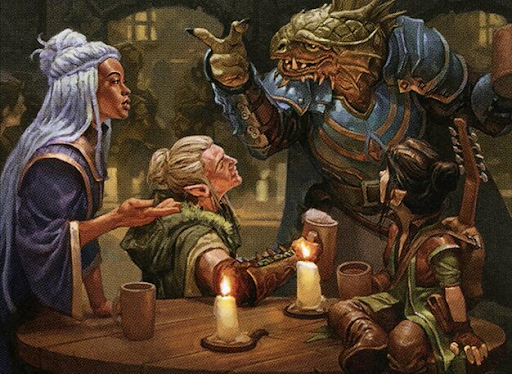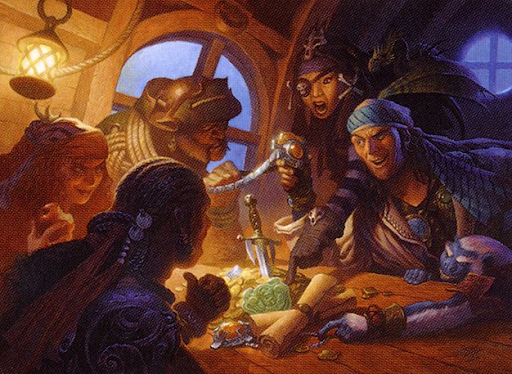10. Come prepared
This can mean a lot of things, whether it’s having your cards ready to go, packing enough dice, or even showing up on time. The more prepared you are for commander night, the smoother it’s going to go. If you arrive to play but have to resleeve or deck, or there’s a staple card missing among a pile of others, then it holds everyone up. A little prep work beforehand goes a long way.

You Meet in a Tavern by Zoltan Boros.
9. Plan your turn ahead of time
Commander games can go long, with a lot of downtime between moments of action. If your game reaches the point where there’s several minutes between your turns, try to refrain from going into your phone. Instead, use that time effectively by building a loose plan of action. Things can change on a dime, but if you have a rough outline of what you want to do, then it’ll help things move along.
8. Commit to moving the game along
Similar to planning ahead for your turns, having a commitment to forward momentum is important. Everyone is sharing the same story, so keeping it from stalling keeps it fresh and exciting. This means attacking with your creatures, letting some spells resolve, or building your decks to have a win condition. By keeping on track with moving the game along, that means more games can happen.

Huddle Up by Magali Villeneuve.
7. Find the fun thing that everyone is trying to do
Commander is all about self expression, and everyone will bring something unique to the game. People love having their decisions validated, so if you think someone is doing something cool at the table, let them know about it. Genuine recognition, as well as appreciation for their company, can build up people’s sense of belonging. Community-building happens whenever you’re in your community.
6. Ask permission before touching people’s stuff
Boundaries are important, even if you don’t recognize that weird rare from Invasion. If you’re curious about something, ask the player first, instead of picking up their card. The urge to touch cards can be instinctive, though, like when tapping your finger or knuckle on a card to indicate it. That can cause dents or damages if you get too excited with it, so it helps you use your eyes first in these kinds of situations.
5. Have a pre-game conversation
Before starting a game, it’s important to talk to the other players over what you’d like to do. These kinds of conversations can vary in length, but the ultimate goal is that everyone gets close enough in terms of what kind of experience they want to have. This is where you can decide if this play group will be right for you, or if you’re better off looking elsewhere. Don’t get too into the weeds over the power level discussion, though, because it’s very difficult to get it just right with total strangers. Over time, that’ll sort itself out.

Rowdy Crew by Steve Prescott.
4. Change decks if there’s a large mismatch in power level
If you easily blew everyone away, or if you got left in the dust, then it’s time to change decks. If you don’t have another deck, see if you can borrow one from another player that might match the rest of the table. This conversation can vary based on the situation, though. If they’re easily winning with their only deck, and refuse to borrow a lower-power one, then it’s time to find a different person to play with. Conversely, if someone has only a low power deck, and they’re getting left behind, then try to either meet them at that level or lend them something that gets them up higher.
3. Recognize when the game is supposed to end
Commander is a great storytelling experience—but all good stories must come to an end. If you feel like the game has been nearing a good conclusion, it might be the time to hold off on playing that board wipe in your hand. This kind of behavior can vary based on how competitive people are, but generally speaking, no one wants to slog through the mud for another 45 minutes as two people battle it out for victory. I try to wrap things up as soon as the first player is eliminated, that way we minimize downtime, and keep everyone involved. I might play more aggressively when we’re down to three players, and that way we can shuffle up and get another one going.
2. Be a good loser/winner
You’re going to win some, and you’re going to lose some. Like in sports, it’s important to not let it get the best of you. If you lose, use it as a learning experience for how you can play better. If you win, treat it as validation for your decisions that you made on the way to victory. How you handle these highs and lows could be the difference if you’re invited back to play again. It’s okay to give it your all-in game, but you don’t want to compromise your friendships over a single game.

Planewide Celebration by Wisnu Tan.
1. Consider how your words and behaviors affect others
What you say and do matters, whether that’s in Magic or in life. How you carry yourself, and how you treat others, has an effect on the people you’re around. While some people are always going to be jerks, many more will look for the good in you if you look for the good in them. Building trust and relationships starts with demonstrating positive behaviors. This could be anything from giving someone recognition for a play you admired, or asking if they had a good time playing against your deck. Positive interactions can snowball into strong relationships, so keep your behaviors in mind.
Travis is a writer and photographer from the wooded foothills of New York, currently living in South Carolina. He plays nearly every Magic format, but has a special love for Legacy, Premodern, and Canadian Highlander. He has loved Magic since Starter 1999, but he champions having a healthy mental and financial relationship with the game. When not playing games, he enjoys cycling, tea, and dog parks. You can follow his exploits here on Twitter and Instagram.



